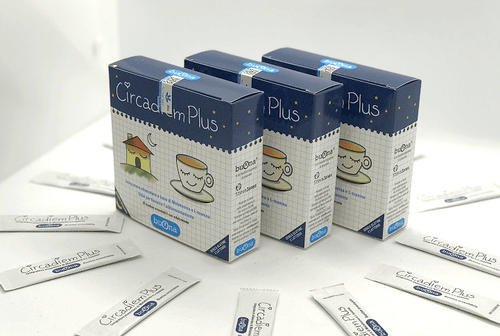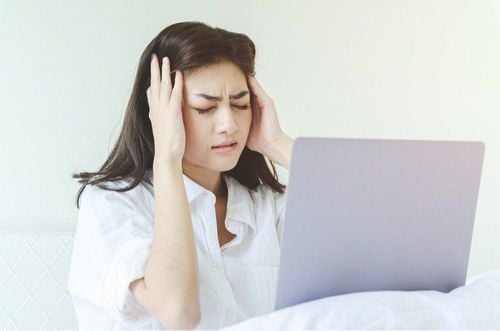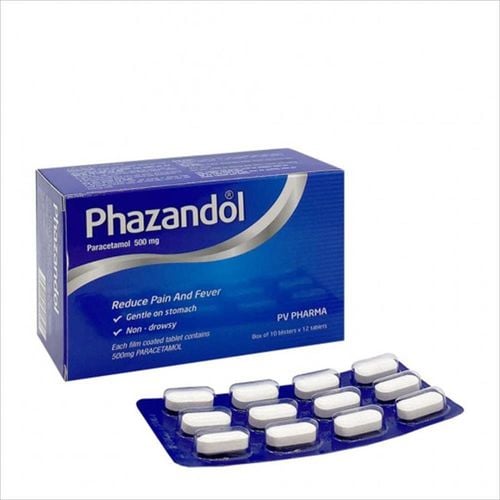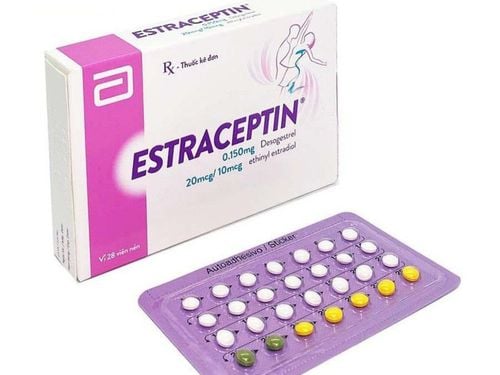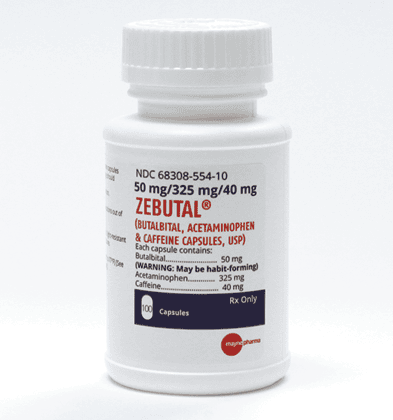This is an automatically translated article.
Many women experience headaches during their period. These headaches can be severe and interfere with daily life, sometimes accompanied by symptoms such as discomfort and tightness in the chest. In this case, here are signs that you may be experiencing premenstrual syndrome, which is characterized by menstrual headaches that occur before, during, or after your period.
1. How are headaches related to the menstrual cycle?
There are many different types and causes of headaches, but there are usually only two causes of premenstrual headaches.
1.1 Tension-type headaches Menstrual headaches are a very common type of headache. These headaches are usually felt on both sides of the head and are characterized by mild to moderate pressure or spasm.
Some people experience similar headaches around the time of their period. However, more research is needed on this type of headache and how it is related to the menstrual cycle.
Trắc nghiệm: Sự hiểu biết của bạn về kinh nguyệt
Kinh nguyệt có vai trò quan trọng đối với sức khỏe sinh sản, do đó nữ giới cần chủ động trang bị kiến thức để theo dõi và kiểm soát tình trạng sức khỏe. Bài trắc nghiệm sau đây sẽ giúp bạn hiểu hơn về chu kỳ kinh nguyệt của bản thân.1.2 Migraine Migraine is a disorder with characteristic headaches that can be debilitating and preceded by a premenstrual headache. Statistics show that about 17.6% of women and 5.7% of men in the US report having experienced at least one migraine in the past year. Migraine headaches are usually quite severe, have a pattern of pain. throbbing and is usually felt on one side of the head. Migraines can have other symptoms, including nausea, vomiting, worsening with activity, and sensitivity to light or sound. Some people with migraine disorders may experience prodromal symptoms, such as visual or sensory symptoms, that occur before or during an attack, which may signal that the pain The first half is coming. Migraine headaches can last up to three days. Women are three times more likely than men to have migraines, the cause of which research has been linked to the effects of cycle-related hormones. menstruation, specifically estrogen. Menstrual migraines are thought to be caused by a drop in hormones before menstruation begins. A small percentage of women experience migraines at the start of their period. These migraines usually last longer and are more nauseating than migraines that occur at other times. If a migraine occurs only at the beginning of your period, it is called a pure menstrual migraine.

Đau nửa đầu có liên quan đến đau đầu khi đến kỳ kinh nguyệt
2. Mechanism of migraine and menstrual-related headache
Menstrual cycle and related hormonal changes can affect people with migraine disorders.
In a study of women referred to headache specialists, about 1 in 10 participants reported that their migraines started around the time of their menstrual period (first menstrual period). first). This may not be true for all women or those who have gone through menopause, as this study was for women seeking care for their headaches, but it does show that menstrual hormones can have an impact on the occurrence of this unpleasant sensation.
Other reproductive stages in life can also affect when a migraine occurs. In the same study as above, two-thirds of people reported headaches reduced or disappeared during pregnancy.
Some women also experience mid-cycle headaches, which may be related to ovulation. In the study, about 16% of participants mainly experienced mid-cycle headaches, while half had post-menstrual headaches.
On the other hand, headaches can also sometimes be part of PMS, accompanied by other unpleasant sensations such as acne, breast engorgement and emotionality.
3. How to treat headaches?
3.1 Remedies for Tension Headaches NSAIDs and Over-the-Counter Pain relievers: NSAIDs (nonsteroidal anti-inflammatory drugs) are a group of pain relievers and anti-inflammatory drugs, many of which are sold over-the-counter. Ibuprofen and ketoprofen were more effective than placebo in improving symptoms in people with tension headaches. In addition, acetaminophen (paracetamol), which is often grouped together with NSAIDs, has also been shown to have similar pain-relieving effects.
Acupuncture: Acupuncture may help reduce the frequency of tension headaches when treated at the onset of menstrual vertigo symptoms. Early studies also show that acupuncture treatment for frequent migraines can help reduce the frequency of migraine attacks in the long term.
3.2 Migraine Remedies Triptans (including sumatripin): This is a medication used to treat acute menstrual migraine. For the drug to work best, sumatripin should be used promptly when the pain level is still mild.
Over-the-counter pain relievers such as naproxen (NSAID) and acetaminophen (paracetamol): These therapies also provide combined pain relief.
Hormone Stabilization Therapy: Prophylaxis with hormone therapy can help reduce the frequency of vertigo headaches during severe menstrual periods. In a study looking at how two hormonal contraceptive treatments affected migraines, the majority of participants were prescribed the combined oral contraceptive pill (pill) and Supplementing with estrogen during the week of menstruation helps to ameliorate the severe drop in estrogen levels. The remaining few use the estrogen patch during a normal menstrual period also to prevent a drop in the hormone. As a result, of all the participants, eight out of 10 said they had reduced their menstrual migraines and were able to halve their need for the same pain relievers.
Birth control pills: Prolonged continuous use of oral contraceptives may be an option to relieve migraine attacks or menstrual-related headaches. That's right, women who have used combined oral contraceptives for a long time have fewer headaches and are more productive.

Phụ nữ đau đầu khi đến kỳ kinh nguyệt có thể sử dụng một số loại thuốc
4. Non-Medication Treatment for Menstrual Headaches
A few methods of treating dizziness headache during menstruation without medication, you can refer to:
Get enough sleep : Because fatigue and sleep disturbances are related to the cause of the pain If you have migraines or tension headaches, be sure to adjust your bedtime accordingly so that you wake up comfortable. If you often have headaches in the morning after you wake up, you should get checked for sleep apnea as soon as possible. Reduce stress levels: Stress, whether it's over events, feelings, or just over specific periods of time, has been linked to triggering migraines and tension headaches. For this reason, stress management techniques such as relaxation therapy, cognitive behavioral therapy, and biofeedback can be helpful. Avoid extreme weather: Changes in weather, both hot and cold, can trigger migraines and tension headaches. Check the weather forecast and plan before you need to go outdoors. At the same time, extreme caution should be exercised when exposed to extreme heat and direct sunlight, as exhaustion and dehydration can also cause headaches. Find a dark and quiet space: For people with migraines, light and sound can worsen symptoms. Some people may find relief by lying in dark and quiet rooms when they experience menstrual cramps. In short, there are hormones that control the body's pain response. During the menstrual cycle, reproductive hormone levels change which can lead to headaches. Because headache and dizziness during menstruation is a common and recurring phenomenon, understanding and prevention is necessary, in order to improve the quality of life of women in general and improve the quality of life. discomfort around the menstrual period in particular. The above are considered the causes of menstrual headaches and how to overcome them. You can apply the following to help improve the situation for the best. In case if the problem does not change, you should go to medical facilities to be checked to get evaluation from a specialist doctor. Vinmec International General Hospital is a high-quality medical care address, when converging a team of doctors with many years of experience, combined with a system of modern equipment. Therefore, when there are any health problems, customers can go to the hospital to be examined for timely intervention. Avoiding it for a long time will affect health as well as make it difficult and expensive to treat.
Please dial HOTLINE for more information or register for an appointment HERE. Download MyVinmec app to make appointments faster and to manage your bookings easily.
Reference source: webmd.com - healthline.com - mayoclinic.org - medicalnewstoday.com - helloclue.com



